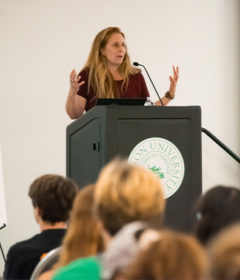‘Justice Grows’ germinated by Law student
 Stetson University College of Law student Kathryn Hamilton said that the idea for Justice Grows germinated in professor Marleen O’Connor’s Food Law & Policy seminar and professor James Fox’s class on poverty law. What started as a research assignment in the classroom in Gulfport, Fla., has blossomed into collaborating with the Florida Farm to School program on a new project that will bring edible gardens to local juvenile residential centers.
Stetson University College of Law student Kathryn Hamilton said that the idea for Justice Grows germinated in professor Marleen O’Connor’s Food Law & Policy seminar and professor James Fox’s class on poverty law. What started as a research assignment in the classroom in Gulfport, Fla., has blossomed into collaborating with the Florida Farm to School program on a new project that will bring edible gardens to local juvenile residential centers.
Hamilton, a student in Stetson’s Social Justice Advocacy Concentration program, said she is finalizing plans for the first garden at a site St. Petersburg, Fla. Ultimately, she said that her goal is to help already established garden programs unite as part of the Florida Farm to School program.
“In 2011, Florida Governor Rick Scott asked juvenile justice centers to improve vocational and educational programs for our youth, and gardens and greenhouses were recommended as low-cost solutions,” Hamilton said. “Youth working on edible garden projects in juvenile residential centers can learn gardening skills and have opportunities to do a service to the community. They also have access to healthy food.”
Hamilton found that many people live in food deserts, areas of town in Florida where it is nearly impossible to access fresh fruits and vegetables unless you own a car. Hamilton’s research shows that about 20% of Florida residents are food insecure, meaning that at some point during one month every year, families aren’t sure how they can pay for their next meal.
“I want the youth in the system to see that they can be responsible for bringing that number down,” said Hamilton. “Edible gardens provide youth with a source of income, one that requires no expertise and hardly any start-up money.”
Hamilton is calling the project Justice Grows because it helps instill leadership and responsibility in young people while addressing issues like hunger, poor health, and lack of access to healthy foods.
“Hunger, poverty and crime are related to our eroding food system,” said Hamilton. “My research revealed that the same families that are not able to find or afford healthy food are often the same families with children entering the juvenile justice system.”
Edible gardens in juvenile residential centers can also provide opportunities for victim restitution and community service, Hamilton explained. The food grown can be donated to food banks and young people can plant gardens in their own neighborhoods. There are already successful edible garden programs in place across the state, said Hamilton.
Hamilton is seeking volunteers willing to work with the project to help build the first site garden in St. Petersburg, and is asking for donations of greenhouse resources and seedlings to the Cypress Creek Juvenile Offender Correctional Center garden in the Lecanto area. She has drafted a proposal for the Department of Juvenile Justice, in charge of the juvenile residential centers. She has also done interview spots with WMNF Tampa and WSRQ Sarasota about her project.
For more information about Justice Grows, visit https://www.facebook.com/justicegrows or email [email protected].
For more news, visit Stetson University College of Law.
by Brandi Palmer



